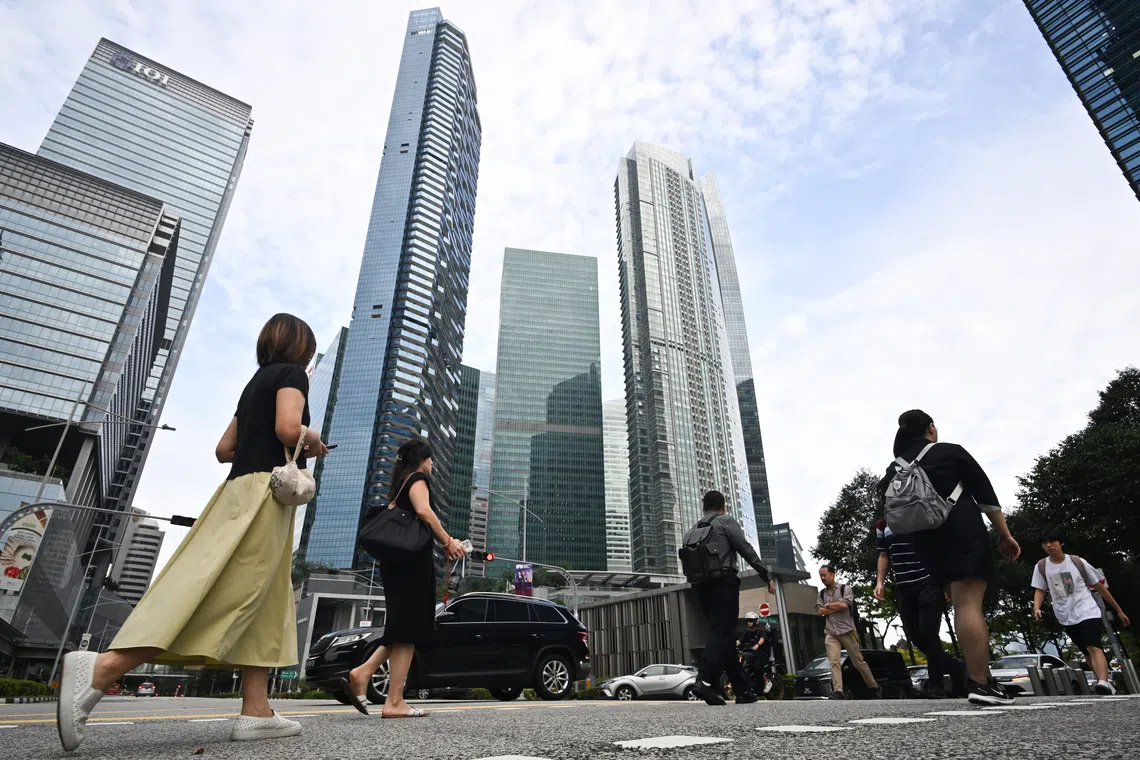Back to office? Singapore workers want free lunch, flexiwork, subsidised commutes: Polls
Sign up now: Get ST's newsletters delivered to your inbox

Discounts and local partnerships, health services and well-being and sport amenities ranked in the top five valued workplace perks.
ST PHOTO: LIM YAOHUI
Follow topic:
SINGAPORE - While Singaporean employees are largely navigating the return-to-office (RTO) mandates with optimism, new data from recent surveys revealed a gap between employees’ expectations for flexibility and perks – and what employers actually provide.
According to JLL Workforce Preference Barometer 2025, which surveyed 500 Singaporean employees, 69 per cent of employees in Singapore now face structured office attendance mandates and are required to work a fixed number of days from office.
Compliance does not appear to be the primary friction point: 63 per cent of employees expressed positive sentiment towards these policies, with 55 per cent citing the belief that they work better together in the office.
However, this acceptance masks a deeper disconnect regarding the specific conditions of work.
Flexibility gap
The most critical disparity lies in the availability of flexible working hours.
According to the 2026 Asia Pacific Workplace Insights report by Colliers, Singapore is a key hybrid market, with 87 per cent of organisations allowing employees to split time between home and the office.
According to JLL, 57 per cent of employees indicated that they would like flexible work arrangements, and 53 per cent reported that it was available to them.
However, the data suggested that this location flexibility has not translated into the ability to set flexible hours.
“Flexibility priorities are transitioning from location preferences to time management needs,” JLL said.
Among Singaporean employees, 64 per cent desire flexible working hours to improve their quality of life, yet only 41 per cent reported having this option.
This 23 per cent gap is one of the widest recorded among key Asia-Pacific markets, second only to Hong Kong at 42 per cent.
This deficit presents a potential retention risk for employers and critical talent differentiator for employees. In Singapore, 61 per cent of employees indicated that flexible work arrangements would drive their decision to choose a new employer.
Employees want more benefits
There is a gap in the welfare benefits provided to justify RTO, data from JLL showed.
It revealed a “commute-worthy” deficit where employee expectations of amenities outpace employer provisions. Some expectations include:
Free lunches: 41 per cent of employees would like free lunches in return for adhering to mandates, yet only 17 per cent of employees reported being promised this benefit. Food services, of which the top expectations are that of free food, subsidised prices, and quality and nutrition, ranked as the most valued workplace amenity.
Flexible working hours: 53 per cent of employees expected flexible working hours as a specific trade-off for mandated office attendance, but only 32 per cent reported that their employers have promised this in their RTO policies.
Employees in Singapore also ranked “free or subsidised travel” as the second most valued workplace perk, after food services. Discounts and local partnerships, health services and well-being and sport amenities ranked in the top five valued workplace perks.
Additionally, employees highlighted access to outdoor spaces, sustainable design, and improved acoustics as key areas for improving employee experience.
Hybrid paradox, top-down disconnect
The Colliers report termed the friction between stated flexibility and rigid operational structure as a “hybrid paradox”.
It refers to how companies are “aspiring for flexibility, but traditional structures for policy and office set-up are still in place”.
Flexibility may be limited in practice, partly due to cultural expectations around visibility and concerns about productivity and collaboration across Asia Pacific.
“The implication of this hybrid paradox is that companies might not be reaping the full benefits of flexibility despite offering it on paper,” the report stated.
“Occupiers that align their workplace design and policies with the flexibility intent will emerge as winners, for example, by reassessing attendance mandates, aligning shared spaces and trusting employees to self-manage in a hybrid environment, while still meeting business needs,” it added.
Yet, Colliers’ survey revealed that there may be a disconnect between employee needs and workplace strategy when it comes to RTO mandates, “risking a gap and overlooking what employees truly value – connection, flexibility and inclusion”, the report stated.
Of those surveyed across Apac, 48 per cent of companies engaged only senior leadership in workplace strategy decisions. Only 19 per cent engaged all employees. THE BUSINESS TIMES

